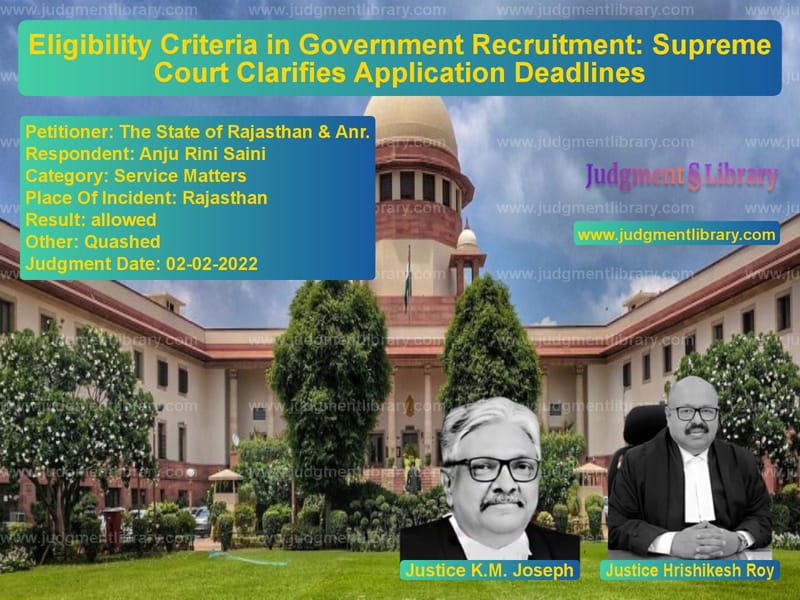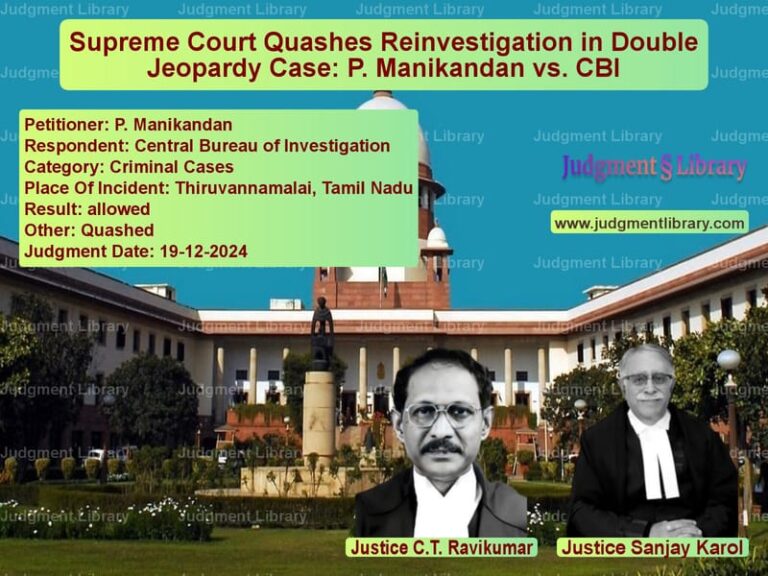Eligibility Criteria in Government Recruitment: Supreme Court Clarifies Application Deadlines
The Supreme Court, in The State of Rajasthan & Anr. vs. Anju Rini Saini, delivered a critical judgment clarifying the importance of fulfilling eligibility criteria within stipulated deadlines in government job recruitments. The case revolved around the rejection of a candidate’s application due to her failure to acquire the necessary qualification within the prescribed timeline.
Background of the Case
The dispute originated from an advertisement issued on 15 February 2013 for the recruitment of Lower Division Clerks (LDC) in Rajasthan. The eligibility criteria required candidates to possess the Rajasthan State Certificate in Information Technology (RSCIT) by the last date of application, i.e., 22 March 2013. The recruitment process also included reservations for women and widows.
The respondent, Anju Rini Saini, applied under the widow category but did not possess the RSCIT qualification by the deadline. Following requests from multiple candidates, the authorities extended the deadline for submitting documents until 7 May 2013. However, the respondent still failed to obtain the qualification within this period and was declared ineligible.
She later acquired the RSCIT certification on 10 November 2014, long after the extended deadline. Despite this, she sought reconsideration in the recruitment process in 2017 when the government revived the hiring process. Her request was denied, leading to litigation.
Arguments by the Parties
Petitioner’s Arguments (State of Rajasthan)
- The respondent did not meet the eligibility criteria by the stipulated deadline (22 March 2013) or the extended period (7 May 2013).
- Government job recruitments must adhere strictly to the eligibility criteria set out in the advertisement.
- The respondent acquired the RSCIT qualification in 2014, well after the selection process had already been finalized.
- The 2017 recruitment notification was not a fresh process but a continuation of the 2013 hiring process, and it only allowed candidates who met the 2013 eligibility criteria.
Respondent’s Arguments (Anju Rini Saini)
- The 2017 recruitment notification allowed previously qualified candidates to submit documents, and she had obtained her RSCIT qualification by then.
- As a widow, she was entitled to benefits under the constitutional provisions promoting equal opportunity and protection under Article 15.
- Since she had secured marks above the cutoff for her category, she should be allowed to compete for the position.
- The state’s refusal to consider her application violated the principles of fairness and social justice.
Supreme Court’s Key Observations
1. Strict Adherence to Eligibility Criteria
The Supreme Court emphasized that government recruitments must strictly follow the eligibility criteria mentioned in advertisements:
“A candidate must fulfill all eligibility conditions, including possessing the required qualification, within the period stipulated in the recruitment advertisement. Allowing post-deadline qualifications would lead to uncertainty and unfair advantages.”
2. The 2017 Recruitment Notification Was Not a Fresh Process
The Court clarified that the 2017 notification was a continuation of the 2013 recruitment process and was not an opportunity for candidates to fulfill eligibility criteria retrospectively:
“The advertisement issued in 2017 did not invite new applications but was meant to continue the stalled 2013 selection process. Only those who had met the eligibility conditions in 2013 were considered.”
3. Acquiring Qualifications Post-Deadline Does Not Confer Rights
The Court reiterated that obtaining qualifications after the stipulated deadline does not grant any retrospective right to participate in the recruitment:
“The respondent obtained the required qualification in 2014, long after the recruitment deadlines had passed. Such an acquisition does not confer any automatic right to appointment.”
4. Sympathetic Consideration Cannot Override Recruitment Rules
While acknowledging the respondent’s circumstances as a widow, the Court stated that sympathy cannot be a substitute for legal requirements:
“Even with all the sympathy that the Court has for the respondent, public employment cannot be granted unless it strictly adheres to the recruitment rules. Deviating from this principle would set a dangerous precedent.”
Final Judgment
The Supreme Court ruled as follows:
- The appeal by the State of Rajasthan was allowed.
- The judgments of the High Court (both Single Judge and Division Bench) were set aside.
- The respondent, Anju Rini Saini, was declared ineligible for the 2013 LDC recruitment as she did not possess the required qualification within the stipulated time.
- The writ petition filed by the respondent was dismissed.
Impact of the Judgment
This ruling sets an important precedent regarding government recruitments and eligibility criteria:
- Ensures strict adherence to recruitment conditions: Candidates must meet all eligibility requirements by the given deadline.
- Clarifies recruitment continuation processes: If a stalled recruitment process is resumed, only originally eligible candidates will be considered.
- Rejects retrospective qualifications: Post-deadline qualifications cannot be used to claim eligibility.
- Prevents judicial interference in hiring rules: Courts must refrain from overriding clear recruitment rules based on sympathy.
The Supreme Court’s decision reinforces the principle that public employment must be governed by transparency and strict adherence to advertised criteria. This ruling prevents undue relaxation of recruitment norms while ensuring fair and merit-based hiring practices.
Petitioner Name: The State of Rajasthan & Anr..Respondent Name: Anju Rini Saini.Judgment By: Justice K.M. Joseph, Justice Hrishikesh Roy.Place Of Incident: Rajasthan.Judgment Date: 02-02-2022.
Don’t miss out on the full details! Download the complete judgment in PDF format below and gain valuable insights instantly!
Download Judgment: the-state-of-rajasth-vs-anju-rini-saini-supreme-court-of-india-judgment-dated-02-02-2022.pdf
Directly Download Judgment: Directly download this Judgment
See all petitions in Recruitment Policies
See all petitions in Public Sector Employees
See all petitions in Judgment by K.M. Joseph
See all petitions in Judgment by Hrishikesh Roy
See all petitions in allowed
See all petitions in Quashed
See all petitions in supreme court of India judgments February 2022
See all petitions in 2022 judgments
See all posts in Service Matters Category
See all allowed petitions in Service Matters Category
See all Dismissed petitions in Service Matters Category
See all partially allowed petitions in Service Matters Category







